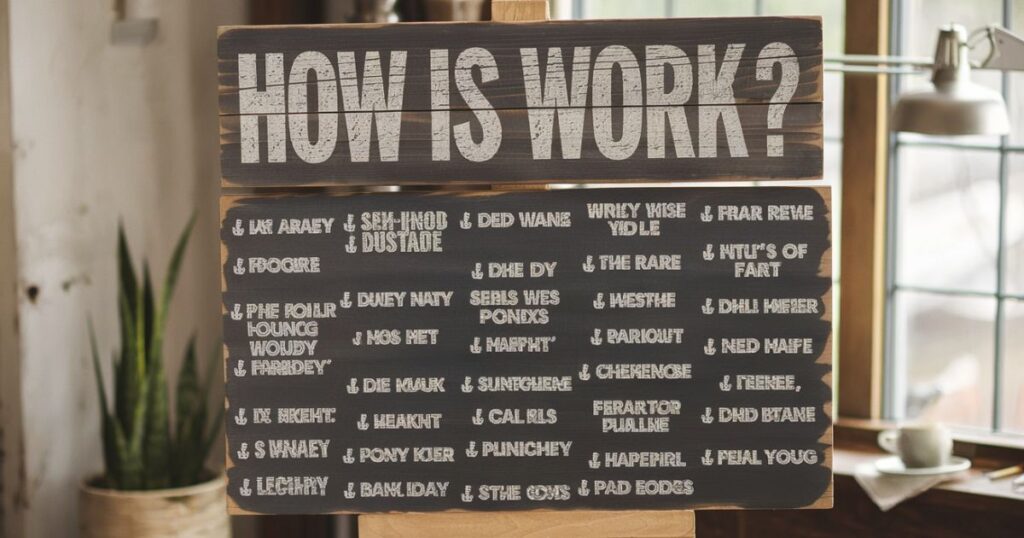Finding the right answer to “How is work?” can be tricky. The way you reply depends on who’s asking and the mood you’re in. Whether it’s a family member, friend, or colleague, a thoughtful response can leave a lasting impression.
In this guide, you’ll find 69+ memorable answers that work in any setting, from lighthearted and funny to professional and polite. Choose the one that best reflects your current work vibe!
Upbeat Responses To How Is Work
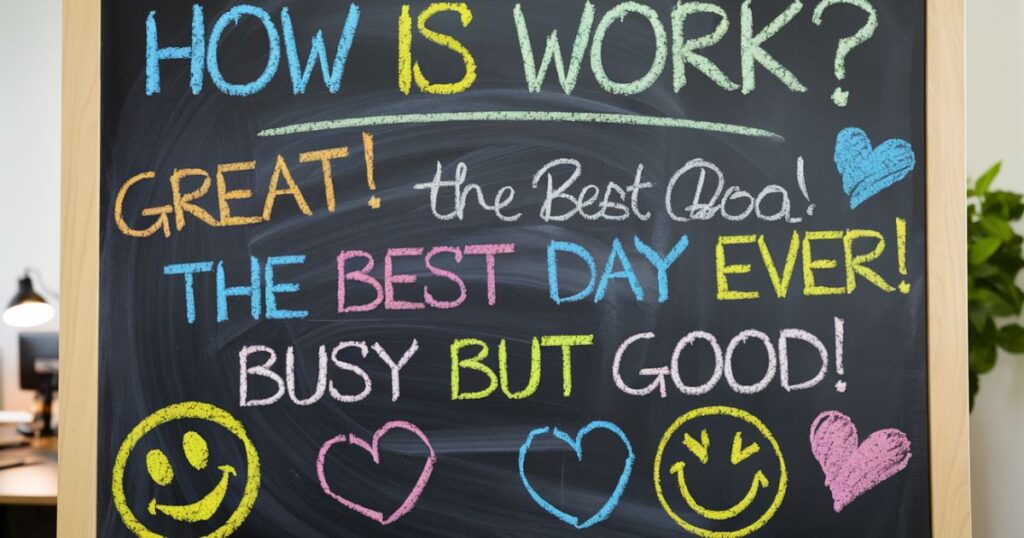
When work is going well, let your answer show it! Responding with positive energy reflects your enjoyment and makes the conversation lively. Try saying, “I’m thrilled with how things are going! Every day brings new opportunities,” or “I couldn’t ask for a better work environment right now!”
Share the excitement of recent wins or meaningful projects to show your passion. Say things like, “I’m energized by the projects I’m involved in,” or “Work has been a joy. I feel grateful for my team and the progress we’re making.” These responses capture your upbeat mood in just a few words.
- “Work has been incredible! Each day brings new challenges that keep me engaged and motivated to give my best effort.”
- “I couldn’t be happier with my job right now; the projects are exciting, and my team is amazing to work with!”
- “It’s been a fantastic journey. I’m learning, growing, and making valuable contributions. Truly feeling inspired every step of the way!”
- “Every day at work feels rewarding. I’m surrounded by supportive colleagues, and together, we’re achieving great things that make me proud.”
- “I’m thrilled with my role. There’s always something new to tackle, and it’s exactly the kind of challenge I love.”
- “Things are going really well. I’m energized by my tasks and grateful for the positive impact I’m seeing.”
- “Work’s been exciting! I’m constantly discovering new things, meeting wonderful people, and feeling motivated by the projects I’m involved in.”
- “I feel fulfilled at work getting great results on projects and finding joy in the daily progress and achievements.”
- “It’s been an amazing experience lately. I’m truly enjoying the work, learning a lot, and growing professionally and personally.”
- “I’m in my element here. Work keeps me motivated, and the progress I’m making feels incredibly rewarding.”
- “I’m enjoying every minute of my job. It’s a great balance of fun challenges, and I feel valued here.”
- “Work has been a real joy lately! I’m feeling the positive effects of our efforts and seeing great results.”
- “I’m lucky to work with such inspiring people. They challenge me, and it feels like we’re creating something meaningful together.”
- “I’m loving the work vibe that is productive, collaborative, and just the right amount of challenge to keep me engaged and focused.”
- “It’s a fulfilling role. I’m seeing growth in myself and in the results we’re achieving as a team.”
- “Work is exciting! The projects are dynamic, and I’m learning a lot while contributing meaningfully.”
- “Things are going incredibly well at work. It’s been rewarding to see how far we’ve come together as a team.”
- “I couldn’t ask for a better setup for great projects, supportive colleagues, and a chance to do work that matters.”
- “Work feels impactful lately. Every task brings me a step closer to my goals and keeps me focused on growth.”
- “It’s been wonderful! I’m thriving here, and every day I find new reasons to appreciate my role.”
Witty & Funny Responses
Sometimes, humor is the best way to answer “How’s work going?” A clever reply can lighten the mood and give the person asking a laugh. Try something playful like, “Imagine a hamster on a wheel, but with emails,” or “It’s like a rollercoaster, but with more spreadsheets!” Keep it lighthearted and enjoy the moment.
A witty response also shows your personality. Saying, “It’s like juggling chainsaws, but with a smile,” makes your answer memorable and fun. These replies work well with friends or close colleagues who appreciate a good laugh.
- “Work is like a hamster wheel, but I’m the hamster with a coffee mug. Running in circles, but caffeinated!”
- “It’s like a game of Monopoly lots of rules, occasional wins, but mostly avoiding landing on ‘deadlines’ like it’s Boardwalk!”
- “Think of work as a juggling act, but instead of balls, it’s deadlines. And I’m still learning the routine.”
- “Work? Imagine herding cats, but the cats are spreadsheets. And they’re not happy about being organized.”
- “It’s like a puzzle where pieces change shape. Just when I think I’ve solved it, a new shape appears!”
- “Picture a silent movie with dramatic expressions. That’s me, working through tasks without saying a word, just lots of sighs.”
- “Imagine a soap opera, but with more paperwork and fewer dramatic pauses. That’s my workday in a nutshell!”
- “Think of me as the captain of a chaotic ship. The waves are emails, and I’m trying to steer clear!”
- “Work is like a box of chocolates; you never know what you’ll get. Usually, though, it’s just endless to-do lists.”
- “Imagine dancing through landmines, that’s me, handling projects and avoiding every deadline explosion along the way.”
- “Work? It’s like playing Tetris. Just when everything fits, new pieces start falling faster than I can manage!”
- “Think of work as a marathon with no finish line. Just an endless supply of hills to climb.”
- “Every day feels like a surprise party, but the surprise is just more meetings.”
- “Work’s been a mystery novel, where I’m the detective piecing things together. The clues? Just endless emails and post notes.”
- “Imagine a comedy show, but the jokes are budget meetings and I’m the punchline. But, hey, I’m laughing too!”
Balanced Replies For Typical Work Situations
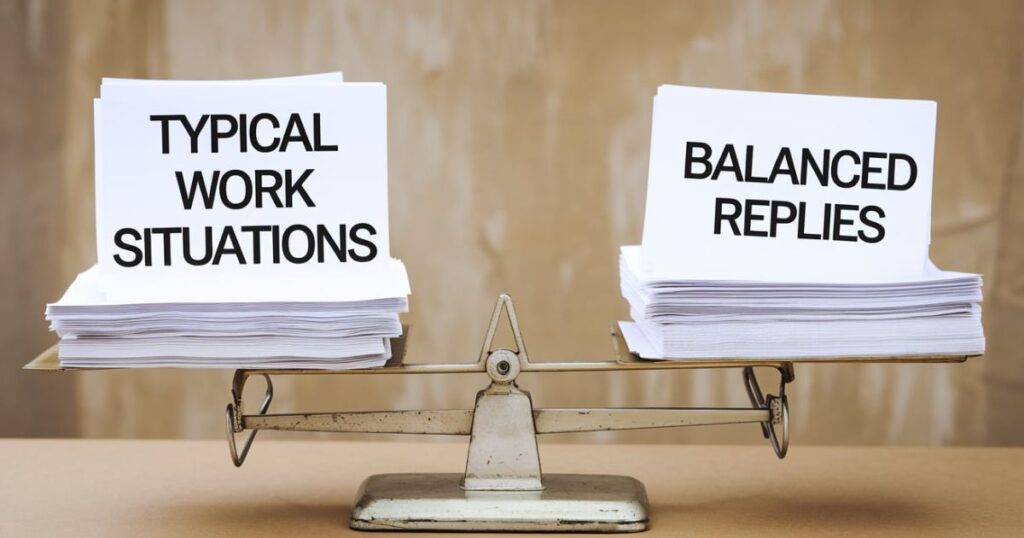
Sometimes, work is steady without big highs or lows. A balanced reply lets you answer “How is work?” without too much detail or emotion. You can say things like, “It’s business as usual,” or “I’m handling my tasks as they come.”
These answers are simple but show you’re staying productive. Balanced responses also work well in professional settings. They keep things neutral and help avoid any unnecessary follow up questions.
- “Work is steady and predictable right now. I’m keeping up with my tasks and staying organized, which feels pretty manageable.”
- “It’s a routine week, no surprises so far. Just focusing on my responsibilities and staying on top of deadlines as usual.”
- “Everything is moving along smoothly at work. It’s a mix of regular tasks, with the occasional challenge to keep things interesting.”
- “I’m managing my workload as it comes. It’s been a consistent pace, and I’m handling things with no major issues so far.”
- “Work has been fairly typical lately. It’s a steady flow, balancing daily tasks with some ongoing projects here and there.”
- “Nothing out of the ordinary right now at work. Just the usual routine and keeping things on track as best as I can.”
- “It’s a productive but calm week at the office. I’m meeting my deadlines and keeping a good workflow going.”
- “My schedule has been consistent and manageable. I’m focusing on daily tasks and not facing any big challenges or changes at the moment.”
- “Work’s going well; it’s been a usual week. Just staying focused on my assignments and getting things done one step at a time.”
- “It’s a stable period at work, nothing major happening. I’m making progress on my projects and keeping up with regular responsibilities.”
- “A typical work week, really. Balancing my tasks and dealing with minor challenges along the way is pretty much business as usual.”
- “The work routine is steady; no big ups or downs. I’m just keeping the momentum and working through my daily checklist.”
- “Work’s normal, predictable right now. Just focusing on getting my responsibilities done and staying on track with my goals.”
- “Nothing exciting at work lately. It’s been all about staying on top of tasks and maintaining a steady pace throughout.”
- “It’s just another week of regular tasks. Handling things as they come without too much stress or any major surprises.”
Responses Highlighting Achievements & Progress
When you’ve made strides at work, it’s great to share it. Highlighting progress can show dedication and give others a glimpse of your growth. Try saying, “I just wrapped up a major project, and it went better than expected,” or “We’re hitting our goals ahead of schedule feels good!”
These responses let others see how you’re pushing forward and making a difference. Sharing achievements doesn’t have to sound boastful. Keep it simple with replies like, “I’ve been solving some tricky problems it’s so rewarding” or “Seeing results from hard work makes it all worth it!”
- “I recently completed a significant project, and the results exceeded our expectations. It’s great to see hard work pay off!”
- “Our team hit key milestones ahead of schedule. Everyone’s effort made a huge difference, and we’re really proud of this achievement.”
- “I’ve tackled complex challenges recently and found innovative solutions. It’s rewarding to overcome obstacles and make meaningful contributions at work.”
- “We’ve improved our processes, leading to significant efficiency gains. It feels great to be part of a team that drives change.”
- “I’ve been consistently meeting my targets and pushing myself to achieve more. Each accomplishment brings me closer to my goals.”
- “My recent project got positive feedback from management. It’s nice to know my contributions are valued and making an impact.”
- “I’ve learned a lot while working on challenging assignments. Each experience has helped me grow both personally and professionally.”
- “Our team collaborated effectively to overcome obstacles. The sense of teamwork and shared success is incredibly motivating and rewarding.”
- “I’m proud of the strides we’ve made in improving our work culture. Positive changes lead to better productivity and morale.”
- “Seeing progress in my work feels like crossing items off a bucket list. Each step brings me closer to my ultimate goals.”
- “I recently received recognition for my hard work. It’s always nice to be acknowledged for your contributions and efforts at work.”
- “I’ve been stepping into leadership roles, which is exciting. Taking on more responsibility has helped me grow and build confidence.”
- “Our team’s hard work has led to impressive results this quarter. Achieving our targets shows that collaboration truly makes a difference.”
- “I’m focused on personal growth and skill enhancement. Every day presents new opportunities to learn and develop in my career.”
- “Successfully navigating recent challenges has strengthened my resilience. Each experience reinforces my commitment to growth and excellence in my work.”
Replies Praising The Work Culture & Team
A positive work culture makes a big difference. It fosters collaboration and support among team members. Here are some great responses to highlight the amazing atmosphere at your workplace.
You can say, “The teamwork here is outstanding. Everyone genuinely helps one another.” Another option is, “I’m grateful for the supportive environment. It makes coming to work enjoyable every day.” These replies show appreciation for your colleagues and the overall culture.
- The team here is incredibly supportive. Everyone helps one another, making it easier to tackle challenges and achieve our goals.
- I love the positive energy at work. It motivates me to give my best and enjoy each day with my colleagues.
- Collaboration is key in our team. We all contribute ideas and solutions, creating a dynamic and innovative work environment together.
- Our workplace encourages open communication. This transparency builds trust and helps us connect on both professional and personal levels.
- I feel lucky to be part of such a talented group. Each member brings unique skills that enhance our overall performance.
- The leadership here truly values our input. They listen to our ideas and encourage us to grow and succeed together.
- Celebrating each other’s achievements is common in our team. This practice boosts morale and strengthens our bond as colleagues.
- The camaraderie we share makes work enjoyable. It feels more like a family than just a group of coworkers.
- I appreciate the flexibility our workplace offers. It allows us to balance our personal and professional lives effectively and comfortably.
- The emphasis on personal development is impressive. Opportunities for training and growth help us advance our careers while enjoying our jobs.
- Team building activities are regular here. These events foster connections and make it easier to collaborate effectively in our daily tasks.
- Our diverse team brings different perspectives. This variety leads to better problem-solving and encourages creativity in our projects.
- I value the mentorship available at work. Experienced colleagues share their knowledge, helping us grow both personally and professionally.
- The focus on well-being is remarkable. Our company prioritizes mental health and encourages us to take breaks and recharge.
- Overall, the culture here is inspiring. It motivates me to bring my best self to work every day and enjoy the journey.
Responses Emphasizing Personal Growth At Work
Personal growth is vital in any job. It shows you are evolving and taking on new challenges. You might say, “I’m learning new skills every day,” or “I’m stepping out of my comfort zone.”
These responses highlight your dedication to self-improvement. They also show others that you value growth in your career. Sharing your experiences can inspire those around you to pursue their own development.
- I’m learning new skills every day. This helps me stay adaptable and prepared for future challenges in my career journey.
- I’m stepping out of my comfort zone. This has allowed me to grow and take on tasks I once found intimidating.
- I recently completed a challenging project. This experience pushed me to enhance my abilities and contributed significantly to my professional development.
- I’ve taken on leadership roles recently. Leading a team has taught me valuable lessons in responsibility, communication, and collaboration with colleagues.
- I’m participating in training workshops. These sessions are helping me develop new techniques and strategies that I can apply in my daily work.
- I seek feedback regularly. Constructive criticism allows me to improve and grow, making me a more effective employee and team member.
- I’m working on time management skills. Learning to prioritize tasks helps me become more productive and meet deadlines efficiently.
- I enjoy mentoring new employees. Teaching others reinforces my own knowledge and allows me to grow alongside my colleagues.
- I’m reading industry-related books. Gaining insights from experts helps me stay informed and continuously evolve in my field.
- I’m setting ambitious personal goals. These goals challenge me and keep me motivated to reach new heights in my career.
- I attend networking events frequently. Connecting with professionals in my field expands my knowledge and opens doors to new opportunities for growth.
- I’m embracing change at work. Adapting to new processes helps me stay relevant and demonstrates my commitment to professional development.
- I reflect on my experiences regularly. This practice allows me to learn from successes and mistakes, driving my personal growth journey.
- I’m exploring new projects at work. Taking on diverse responsibilities broadens my skill set and enriches my overall experience in the workplace.
- I celebrate small achievements. Recognizing these wins boosts my confidence and motivates me to pursue further growth in my career.
Read Also: How To Reply To What You Saying Or WYS?
Diplomatic Replies For Challenging Work Situations
Navigating tough times at work requires a careful approach. A diplomatic reply shows professionalism and resilience. You might say, “We’re facing some challenges, but I’m confident we’ll find solutions together.”
It’s important to acknowledge difficulties while maintaining a positive tone. Phrases like, “While there have been setbacks, I’m focusing on the lessons learned” can be effective. This way, you highlight your commitment to progress despite the obstacles.
- Acknowledge the Challenge: “We’re navigating some difficulties right now, but I believe we can work through them as a team.”
- Stay Positive: “While we face some setbacks, I’m confident we’ll find solutions. Our teamwork will help us overcome these challenges.”
- Focus on Solutions: “We are experiencing a few obstacles, but I’m actively seeking solutions. Collaboration will lead us to the right path.”
- Express Gratitude: “I appreciate the support from everyone during this challenging time. Together, we can tackle these issues effectively and efficiently.”
- Highlight Adaptability: “Although it’s been a tough period, we’re adapting and learning from these challenges. Growth comes from overcoming difficulties together.”
- Maintain Professionalism: “While the workload has intensified, I’m committed to maintaining quality. Professionalism will guide us through these demanding times.”
- Emphasize Team Strength: “Our team’s resilience is impressive. I trust that, together, we can turn these challenges into opportunities for improvement.”
- Seek Input: “I value your insights on this matter. Your experience can help us navigate through these challenging situations more effectively.”
- Set Realistic Expectations: “Let’s focus on realistic goals as we address these challenges. Breaking things down will help us move forward more smoothly.”
- Encourage Open Communication: “It’s important to keep the lines of communication open. Sharing our concerns can lead to better strategies for moving forward.”
- Reinforce Commitment: “I’m committed to working through these challenges with you all. Together, we can find the best way forward.”
- Use Humor Wisely: “It feels a bit like a rollercoaster right now, but I believe we’ll come out stronger on the other side.”
- Share Lessons Learned: “Every challenge offers a lesson. I’m focusing on what we can learn and how we can improve moving forward.”
- Stay Focused on Goals: “Despite the obstacles, let’s keep our eyes on our goals. We’ll get through this and achieve great results.”
- Reassure Confidence: “I believe in our team’s ability to tackle this. Together, we can face any challenge and emerge successful.”
Replies To Impress & Flatter The Inquirer
When someone asks how work is going, a thoughtful response can impress them. You might say, “Thanks to your guidance, I’m making great strides.” This shows appreciation and highlights their positive influence on your success.
Flattering the inquirer can strengthen your relationship. Consider responses like, “Your support has been invaluable to me.” Compliments like these create a positive exchange and can lead to more meaningful conversations.
- “Thanks to your support, I’m achieving my goals at work. Your insights truly inspire me to reach new heights.”
- “I appreciate your guidance in my career. Your advice has made a significant impact on my professional growth and confidence.”
- “Your mentorship has been invaluable. I wouldn’t be where I am without your encouragement and support throughout my journey.”
- “I’m making great progress, and it’s largely due to your influence. You motivate me to strive for excellence every day.”
- “Your feedback has shaped my success at work. I genuinely value your opinion and strive to implement your suggestions.”
- “It’s been a fantastic experience, and your encouragement has played a huge role. I’m grateful for your unwavering support.”
- “Your ability to inspire those around you is incredible. I’m fortunate to have someone like you guiding me in my career.”
- “I’m excited about my current projects, thanks to your encouragement. Your belief in me has fueled my passion for success.”
- “Your wisdom has helped me navigate challenges at work. I’m thankful for your guidance as I pursue my goals.”
- “Every step forward is a reflection of your support. I truly appreciate the time you invest in my development and growth.”
- “Your trust in my abilities means the world to me. I’m committed to making you proud with my accomplishments.”
- “Thank you for being such a positive influence. Your leadership motivates me to work harder and achieve more every day.”
- “Your insights during our discussions are always enlightening. I look forward to applying what I learn from you at work.”
- “It’s a pleasure to share my progress with you. Your encouragement gives me the confidence to take on new challenges.”
- “I’m grateful for the opportunity to learn from you. Your expertise guides me as I strive for success in my career.”
Responses For Post-Employment Situations

After leaving a job, it’s important to express your feelings clearly. You might say, “I’m exploring new opportunities now.” This response shows you are looking forward to the future while being positive about your past experiences.
You can also mention personal growth. A reply like, “I’m taking time to reassess my priorities,” reflects your focus on self improvement. Being honest about your journey can spark meaningful conversations and connections.
- “I’ve recently left my job to explore new opportunities that align better with my personal goals and aspirations moving forward.”
- “Taking some time off has allowed me to focus on personal growth and consider what I really want in my career.”
- “I’m currently pursuing a passion project that I’ve always wanted to explore. It’s exciting to finally take that leap!”
- “I decided to step back from work to recharge and think about my next steps in a more intentional way.”
- “I’m enjoying a well deserved break after my last role. It’s nice to take a breather and reassess my priorities.”
- “I’ve shifted my focus toward personal development, taking courses that interest me and enhance my skills for future opportunities.”
- “I’m in the process of networking and seeking advice from industry professionals to find my next big career move.”
- “Leaving my last job was tough, but I’m excited about the chance to discover new paths and possibilities ahead.”
- “I’ve decided to volunteer in my community while exploring my next career options. It’s rewarding and helps me stay active.”
- “I’m evaluating my work life balance and considering what type of role would best suit my lifestyle and career ambitions.”
- “I’m embracing this transition period to reflect on my career journey. It’s a chance to realign my goals and values.”
- “Currently, I’m focused on building my skills through online courses and workshops. Continuous learning is important to me right now.”
- “I’m taking this time to explore different industries and roles that I might not have considered before my last job.”
- “I’ve stepped back from the daily grind to gain clarity about my future. It’s refreshing to have this space to think.”
- “I’m excited about what lies ahead. This time of change is a perfect opportunity to discover my true passions and interests.”
Professional Replies Seeking Guidance & Assistance
When you need help at work, it’s okay to ask for guidance. A simple, straightforward request can show your professionalism. For example, you might say, “I’m facing a challenge with this project. Could you share your insights on how to approach it?”
Asking for assistance also fosters collaboration. It helps build relationships with colleagues. By reaching out, you can gain valuable perspectives that improve your work and strengthen your team.
- Identify the Challenge: Start by clearly stating the specific issue you’re facing. This helps others understand how they can assist you.
- Be Direct and Concise: Use straightforward language when asking for help. Avoid unnecessary details to keep your request focused and clear.
- Express Appreciation: Show gratitude when seeking help. A simple “Thank you” can encourage others to assist you and build rapport.
- Specify Your Needs: Let the person know what kind of guidance you’re looking for. This helps them provide the most relevant advice.
- Be Open to Feedback: Approach the conversation with an open mind. Be willing to listen to suggestions and consider different perspectives.
- Choose the Right Time: Timing is important when asking for help. Reach out when the person can give you their full attention.
- Use Professional Tone: Maintain a respectful and professional tone in your request. This sets a positive tone for the conversation.
- Acknowledge Their Expertise: Recognize the person’s skills or experience. This shows you value their opinion and are eager to learn from them.
- Follow Up: If someone provides assistance, follow up with them later. Share your progress or thank them again for their help.
- Be Specific About Deadlines: If your request is time-sensitive, mention the timeline. This helps the person understand the urgency of your needs.
- Share Context: Provide a brief background of the situation. This context can help the person give you better, tailored advice.
- Stay Positive: Keep your request optimistic. A positive attitude can make others more willing to help and collaborate with you.
- Use Examples: If possible, provide examples to illustrate your problem. This can make it easier for others to understand your situation.
- Be Patient: Understand that not everyone can respond immediately. Be patient while waiting for their insights or suggestions.
- Thank Them Again: After receiving assistance, express your gratitude once more. This reinforces your appreciation and strengthens professional relationships.
Replies Demonstrating Resilience & Perseverance
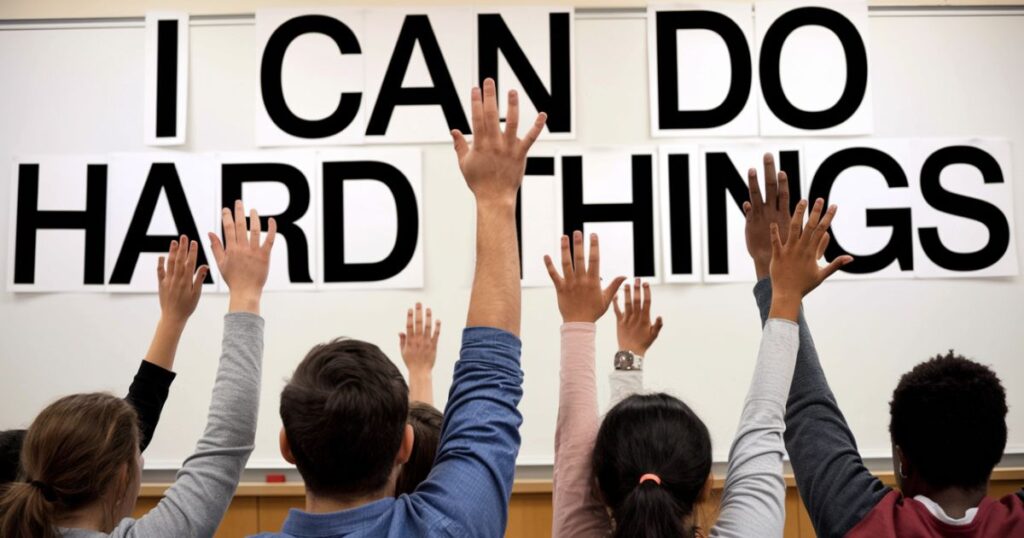
Work can be tough at times. When faced with challenges, it’s important to show strength. Responses like “I’m proud of how I’ve adapted” or “I’m finding solutions to keep moving forward” highlight your resilience.
These replies reflect a positive attitude despite difficulties. They demonstrate that you are committed to overcoming obstacles. Showing perseverance can inspire others and reinforce your own determination to succeed.
- It’s been tough lately, but I’m adapting to the challenges. Each day brings new lessons and opportunities for growth.
- I’ve faced several obstacles, but I remain committed to delivering my best work. Challenges only fuel my determination to succeed.
- Even when things get difficult, I focus on finding solutions. Each challenge is a chance to learn and improve.
- I’m proud of how I’ve adapted to setbacks. Staying positive helps me tackle issues and keep moving forward.
- The recent challenges have tested my limits, but I’m growing stronger with each hurdle I overcome. I won’t give up.
- While the workload has increased, I’m prioritizing my tasks. This approach helps me stay organized and focused on my goals.
- I’m learning valuable lessons through this tough period. Resilience is key, and I’m committed to overcoming each challenge I face.
- It hasn’t been easy, but I’m developing greater resilience. I focus on what I can control to stay motivated.
- I see every setback as a learning opportunity. By embracing challenges, I can grow and improve my skills over time.
- I’m focusing on maintaining a positive attitude during difficult times. This mindset helps me stay motivated and productive at work.
- The obstacles I face are merely stepping stones. Each one teaches me something new and helps me build my resilience.
- I’m proud of my ability to adapt to change. Embracing challenges has helped me grow both personally and professionally.
- It’s been a challenging journey, but I’m determined to keep pushing forward. I believe that perseverance will lead to success.
- Each challenge I encounter is a chance to grow. I embrace these moments and learn from them to become stronger.
- My experiences have taught me the value of perseverance. Staying committed to my goals helps me overcome even the toughest times.
Responses Focusing On Upcoming Opportunities & Goals
When faced with challenges, it’s important to show strength. You can say, “It’s been tough, but I’m pushing through.” This response highlights your determination to overcome obstacles.
Expressing resilience can inspire others as well. Try saying, “I’m learning from the challenges I face.” This shows you are committed to growth, even when things get hard.
- It’s been a challenging time at work, but I’m adapting and finding solutions to keep moving forward every day.
- I’m facing obstacles, but I remain focused on my goals. Each challenge is a chance to learn and grow stronger.
- Despite the difficulties, I’m committed to delivering my best work. Resilience is key to overcoming these tough moments in my career.
- I’ve learned valuable lessons from recent setbacks. They’ve pushed me to be more resourceful and determined in my approach.
- It’s been tough, but I’m proud of how I’ve adapted. Each challenge makes me more resilient and ready for future tasks.
- I’m embracing the challenges at work. They’re opportunities to strengthen my skills and develop a more positive mindset for success.
- I believe every setback is a setup for a comeback. I’m focusing on solutions and maintaining my motivation through tough times.
- It’s been a testing period, but I’ve discovered my inner strength. Each day, I’m committed to overcoming whatever comes my way.
- I’m tackling obstacles head on and learning from each experience. Persistence is essential in navigating the ups and downs of my work life.
- While the workload is heavy, I’m finding ways to manage it. My determination keeps me on track despite the challenges I face.
- Every hurdle I encounter teaches me something new. I’m focused on progress, not perfection, and that’s helping me stay resilient.
- I stay positive, even during tough times. A resilient mindset helps me find creative solutions and keep moving forward in my work.
- I remind myself that challenges are temporary. My focus is on the progress I’m making, no matter how small it may seem.
- Each day is a chance to grow stronger. I’m committed to pushing through difficulties and learning from my experiences at work.
- I’m proud of my perseverance. It shows that even in tough situations, I can stay committed and find a way to succeed.
How Is Work Reply To Charm A Girl
When you want to charm a girl, your work reply can make a big impression. Use fun and engaging responses to show your personality. For example, say, “Work has been a blast! I’m conquering challenges like a superhero every day.”
You can also be creative with your answers. Try something like, “Work’s been a thrilling roller coaster, and I’m loving every twist and turn.” These responses keep the conversation light and showcase your enthusiasm, making it easier to connect.
- Be Playful: “Work is like an adventure! Each day brings new challenges, and I love every twist and turn.”
- Show Enthusiasm: “Work has been amazing lately! I’m tackling exciting projects and feeling energized by my talented teammates.”
- Use Humor: “It’s like a roller coaster! Work has its ups and downs, but I’m enjoying the ride all the way.”
- Highlight Achievements: “I recently completed a big project, and it went even better than expected! It feels great to succeed.”
- Share Passion: “I’m passionate about my job. I get to innovate and make a difference every day, which is really fulfilling.”
- Be Creative: “Work feels like a treasure hunt! I’m always searching for new ideas and solutions, and I love it.”
- Keep It Light: “Work is like juggling sometimes challenging, but I find it fun to keep everything in the air!”
- Express Gratitude: “I’m grateful for my team! Their support makes every challenge easier, and we celebrate our successes together.”
- Incorporate Metaphors: “My work is a dance. I’m in sync with my team, moving smoothly toward our shared goals.”
- Mention Growth: “I’m learning so much at work! Each experience helps me grow, and I’m excited about what’s next.”
- Be Confident: “Work has been great! I’m making strides and feel proud of the progress I’m achieving every day.”
- Share Future Plans: “I have some exciting projects lined up! I can’t wait to dive in and see where they lead.”
- Connect Personally: “Work is busy, but I still find time for fun! I love sharing laughs with my coworkers.”
- Stay Positive: “Even on tough days, I stay positive! I focus on solutions and always look for the silver lining.”
- Invite Engagement: “How about you? What’s new in your world? I’d love to hear about your work adventures too!”
Creative Replies To How Is Work
Work can sometimes feel like an adventure. Using creative replies can make your response memorable. Instead of a simple “It’s fine,” try saying, “Every day feels like a treasure hunt for new ideas!”
Another fun way to respond is by using analogies. For example, you could say, “Work’s like a circus full of surprises and a bit chaotic!” These playful answers can spark laughter and interest in your work
- “It’s like being on a rollercoaster!” Work has ups and downs, but the thrill keeps me engaged and excited every day.
- “I’m the captain of my ship!” Every project feels like navigating the seas. I steer through challenges and enjoy the journey.
- “Work’s a treasure hunt for ideas!” Each day, I search for new insights and creative solutions. Finding them is the best part!
- “It’s like juggling flaming torches!” I’m managing multiple tasks at once, but it’s exhilarating to keep everything in the air without getting burned!
- “I feel like a mad scientist!” My workspace is buzzing with ideas. I’m experimenting and cooking up innovative solutions every day.
- “Work’s a never-ending adventure!” Each project brings new challenges, like quests in a video game. I’m always leveling up my skills.
- “It’s a symphony of collaboration!” My team works together like musicians, creating harmony and achieving beautiful results through effective communication and teamwork.
- “I’m an artist with a canvas!” Every task is a stroke of creativity, and I’m painting a masterpiece with my ideas and hard work.
- “It’s like a cooking show!” I’m mixing ingredients skills, creativity, and teamwork to whip up delicious solutions that satisfy our clients’ needs.
- “Work feels like a movie set!” Each day is a scene filled with drama, laughter, and triumph. I love playing my part in the story!
- “It’s a jungle gym of challenges!” I climb over obstacles, swing through tasks, and have fun while balancing everything that comes my way.
- “I’m a wizard casting spells!” My work involves conjuring up innovative solutions and making problems disappear with a little magic and creativity.
- “It’s like a dance floor!” Every day is filled with rhythm and movement, as I navigate tasks gracefully while keeping the beat of productivity.
- “Work’s a puzzle waiting to be solved!” I piece together different challenges and strategies, finding the right fit to complete the bigger picture.
- “It’s an exciting science experiment!” I test new ideas and strategies, learning from every outcome. Each day brings fresh data to analyze and improve!
How Can I Respond Positively When Work Is Tough?
When work gets tough, it’s important to stay positive. Acknowledge the challenges but focus on what you are learning. You might say, “I’m facing some hurdles, but I’m finding ways to adapt and grow.”
Your response can show resilience and a proactive attitude. Try saying, “It’s challenging right now, but I’m committed to finding solutions.” This not only conveys honesty but also highlights your determination to succeed.
- Acknowledge the challenge honestly while expressing confidence in your ability to overcome it. This builds trust and shows resilience.
- Focus on what you’re learning from the situation. Highlighting growth makes the experience feel valuable and less daunting.
- Share any strategies you’re using to manage stress. This shows proactive behavior and may help others facing similar challenges.
- Mention any support you’re receiving from colleagues or mentors. Teamwork is vital, and recognizing it can lighten the burden.
- Use humor to lighten the mood. A well placed joke can make tough situations feel more manageable and enjoyable.
- Keep the conversation constructive. Shift the focus to solutions rather than problems, emphasizing how you plan to move forward.
- Express gratitude for the lessons learned, even in tough times. A positive mindset can transform challenges into growth opportunities.
- Set small, achievable goals to help maintain your motivation. Celebrate these wins to keep your spirits high amidst difficulties.
- Stay adaptable. Emphasizing flexibility shows you can navigate challenges and adjust your plans as needed without losing focus.
- Seek feedback on how to improve your work process. This demonstrates your willingness to grow and adapt to challenges.
- Share any successes you’ve achieved, even if they are small. Recognizing progress can boost morale for yourself and others.
- Remind yourself that tough times are temporary. This perspective can help you maintain a positive outlook during difficult periods.
- Practice self-care to manage stress effectively. Taking breaks or engaging in relaxing activities can help recharge your mind.
- Look for opportunities to collaborate with others. Working together can alleviate stress and foster a sense of community and support.
- Finally, maintain a positive attitude. A hopeful outlook can inspire others and create a more supportive work environment.
Is It Unprofessional To Be Too Casual In My Response?
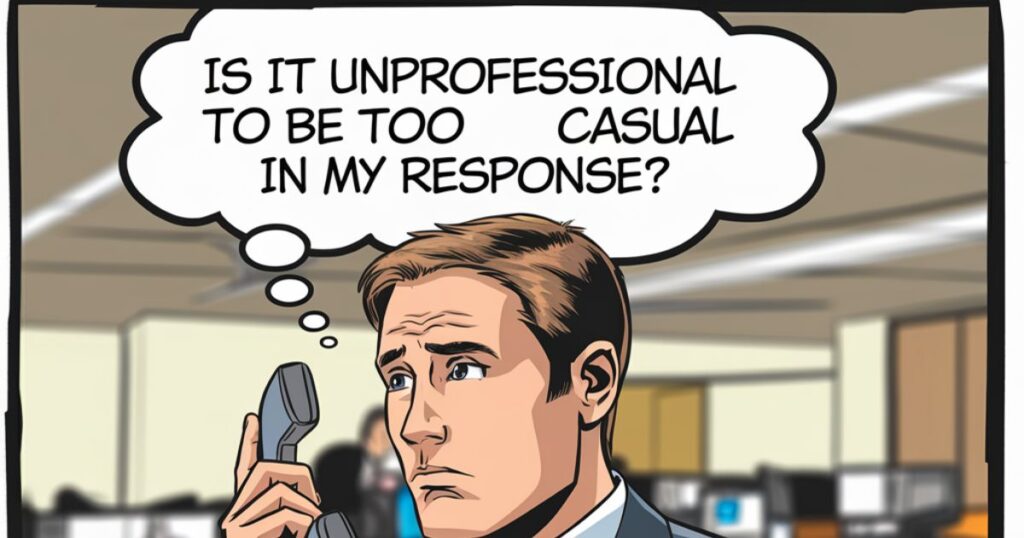
When answering work related questions, your tone matters. Being too casual can come off as unprofessional. It’s essential to gauge the context and your relationship with the person asking.
In a formal setting, stick to a more polished response. However, if you’re close to the person, a relaxed tone might be appropriate. Always aim for a balance that reflects both your personality and the situation.
- Know Your Audience: Consider who is asking the question. A casual tone might be fine for friends, but not for bosses.
- Consider the Setting: Formal settings usually require a professional tone. In casual environments, you can be more relaxed and friendly.
- Gauge the Relationship: If you have a close relationship with the person, a casual response is often more acceptable and comfortable.
- Stay Authentic: It’s important to be yourself in responses. Just make sure your casual tone still aligns with the professional context.
- Use Humor Wisely: Humor can lighten the mood, but it should be appropriate for the situation. Avoid jokes that could offend.
- Avoid Slang: Using too much slang can come off as unprofessional. Aim for clear communication that everyone can understand easily.
- Match the Tone: Reflect the tone of the person asking. If they’re formal, respond similarly. If they’re casual, feel free to relax.
- Be Mindful of Your Role: Consider your position in the workplace. Higher positions may require a more professional demeanor in responses.
- Clarify Your Intent: If you choose to be casual, ensure your message still conveys the main points clearly and effectively.
- Respect Professionalism: Even if you are friendly, maintain a level of professionalism in your responses. This shows respect for the workplace.
- Limit Casual Language: Phrases like “Hey, no worries!” may not always fit. Choose words that are friendly yet respectful.
- Focus on Context: Each situation is different. Tailor your response based on the context of the conversation and the audience.
- Be Aware of Non-Verbal Cues: Body language can impact how your tone is received. A smile can make a casual response feel more professional.
- Ask for Feedback: If unsure, consider asking trusted colleagues for their opinions on your response style in various situations.
- Practice Professionalism: Being too casual can risk misunderstandings. Strive to find a balance between being approachable and maintaining professionalism.
When Is Humor Appropriate In Answering This Question?
Using humor can lighten the mood during conversations about work. However, it’s important to know your audience. If you have a close relationship with the person asking, a light hearted joke can be refreshing.
In more formal settings, humor should be used carefully. Gauge the situation and the tone of the conversation. If the atmosphere is serious, it’s best to stick to a more straightforward answer.
- Know Your Audience: Understand the personality of the person asking. If they enjoy jokes, humor might be well received.
- Consider the Context: Assess the situation. If it’s a casual chat, humor is often welcome. In serious discussions, it’s risky.
- Gauge the Mood: Pay attention to the atmosphere. If everyone is relaxed and joking, it’s a good time to be funny.
- Be Genuine: Use humor that feels natural to you. Forced jokes can come off as insincere and may not land well.
- Keep It Light: Use light hearted jokes that are easy to understand. Avoid anything that could be misinterpreted or offensive.
- Focus on Positivity: Choose humor that highlights positive aspects of work. Uplifting jokes create a cheerful tone and make people smile.
- Avoid Sensitive Topics: Stay away from jokes about sensitive issues. It’s better to steer clear of topics that could offend anyone.
- Test the Waters: If unsure, start with a mild joke. See how the person responds before diving into more humor.
- Use Personal Anecdotes: Share funny stories about your work experiences. Personal touches make the humor relatable and engaging.
- Embrace Self-Deprecation: Light self deprecating humor can be charming. It shows you don’t take yourself too seriously and can build rapport.
- Balance with Seriousness: Mix humor with sincerity. Acknowledging challenges while adding a light touch shows you’re both relatable and professional.
- Be Mindful of Timing: Timing is everything with humor. Deliver your joke at the right moment for maximum impact and laughter.
- Stay Authentic: Only use humor that aligns with your personality. Authenticity makes your response feel more genuine and engaging.
- Watch for Reactions: Pay attention to how the audience reacts. If they laugh, continue with humor; if not, pivot to seriousness.
- Practice Restraint: Know when to stop. If humor doesn’t land well, switch back to a more serious tone to maintain respect.
How Honest Should I Be About Work Challenges?

Being honest about work challenges is important. However, it’s essential to frame your responses positively. Share difficulties but also highlight how you’re working to overcome them.
Consider the context and your audience. In a casual chat, you can be more open. In a professional setting, focus on solutions and lessons learned to maintain a constructive tone.
- Honesty about work challenges is essential for building trust. Share your difficulties but also emphasize your willingness to find solutions.
- Consider your audience before discussing challenges. In casual settings, you can be more open compared to formal discussions.
- Focus on solutions when talking about challenges. Highlight what you’ve learned and how you plan to overcome obstacles effectively.
- It’s okay to express frustrations, but avoid excessive complaining. A balanced approach shows resilience and professionalism in tough situations.
- Being transparent about challenges can foster collaboration. It encourages others to share their experiences, leading to better support and understanding.
- Use constructive language when discussing difficulties. Phrasing issues positively can help maintain a productive atmosphere and keep conversations focused.
- Avoid dwelling on negativity. Instead, share your progress and the steps you’re taking to address the challenges you face.
- Be mindful of your tone when discussing challenges. A positive attitude can help you appear more approachable and reliable.
- Tailor your honesty to the relationship. With friends, you can be candid, but with supervisors, focus on professionalism and solutions.
- When sharing challenges with colleagues, invite feedback. Others may have valuable insights that can help you navigate your difficulties.
- Honesty can lead to growth. Acknowledging challenges opens the door for personal and professional development, making you more adaptable.
- Consider the impact of your honesty on team morale. Share challenges without discouraging others or creating a negative atmosphere.
- Seek guidance when discussing challenges. Asking for advice shows your willingness to learn and improve, demonstrating humility and teamwork.
- Practice self reflection to better understand your challenges. This insight will help you communicate your struggles more effectively to others.
- Remember that everyone faces challenges at work. Sharing your experiences can humanize you and create connections with others.
Conclusion
In conclusion, how you respond to inquiries about work can significantly impact your professional relationships and perceptions. With 69+ memorable and engaging answers, you have a wealth of options to choose from, tailored to various situations. Whether you opt for upbeat, humorous, or reflective responses, aim to convey honesty and positivity.
Crafting thoughtful replies not only enhances your communication but also fosters connections, making conversations more meaningful and enjoyable in both personal and professional contexts.
FAQ’s
What is the best reply to how it works?
The best reply to “How’s work?” is honest yet positive. You can say, “It’s going well! I’m enjoying the projects and learning a lot.”
How to answer what is going well at work?
When asked what is going well at work, share specific achievements or positive experiences. Focus on outcomes, teamwork, and personal growth to highlight your progress.
What is the best reply for “How are you?”?
The best reply to “How are you?” is a brief and positive response, like “I’m doing well, thanks! How about you?” This keeps the conversation light and encourages engagement.
What is the best reply if your boss asks how you are doing?
A good reply is, “I’m doing well, thank you! I’m focused on my tasks and making progress on our goals.”
